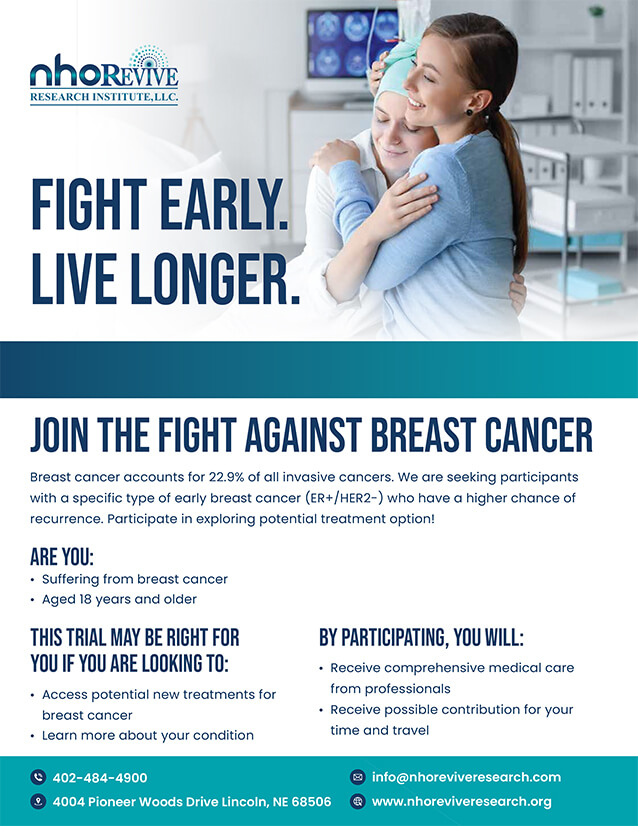Explore the latest updates and developments in breast cancer clinical trials. Join now to participate and contribute to a pioneering breast cancer research study.
Breast Cancer Clinical Trials
Understanding Breast Cancer Clinical Trials in Nebraska
Explore Clinical Trials for Breast Cancer
Breast cancer occurs when cells in the breast undergo mutations, resulting in cancerous cells proliferating and developing tumors. Early-stage breast cancer refers to cancer that remains localized within the breast or the nearby axillary lymph nodes. This breast cancer research study is categorized as a phase 3 open-label study, evaluating whether the studied drug results in favorable outcomes compared to standard drug therapy prevalent in patients.
Moreover, clinical trials for breast cancer aim for patients with early breast cancer at intermediate-high or high risk for recurrence post-therapy. Eligible participants or patients must meet specific eligibility criteria. This breast cancer research study will follow up on one of the patients 10 years from now. In addition to this, the treatment duration is aimed for 7 years in each arm.
Eligibility Criteria for Breast Cancer Clinical Trials in Nebraska
- Age: 18 years and older (Adults, Older Adults)
- Gender: All
- Participants must be enrolled in this breast cancer clinical trials in Nebraska within 12 months after undergoing surgery.
- Sufficient organ and bone marrow function
- Total Studies: 02
*Participation in our clinical study is voluntary, and it’s important to consult with your healthcare provider before making any decisions related to your treatment or care.
*Participation in the clinical trials causes no expenses for you or your private medical insurance. You’ll receive compensation for your time and travel.
About Symptoms of Breast Cancer and More
Breast cancer clinical trials aim to discover the best treatment options for breast cancer. Breast cancer is a condition where cells in the breast mutate and multiply uncontrollably, forming tumors. Breast cancer symptoms may include changes in breast shape, skin, nipple, appearance of lump or mass, swelling, and pain. Moreover, understanding the stages of breast cancer is essential to uncover the best potential treatment for breast cancer and to manage the disease effectively.
Furthermore, timely detection of breast cancer can significantly improve the chances of successful treatment plans and survival rates. Clinical trials for breast cancer can help tremendously to discover potential treatment for breast cancer that can be applied to a wide variety of audiences.
What to Expect
If you volunteer for NHO Revive clinical trial by completing the form above, our study team will reach out to assess your eligibility for this breast cancer clinical trial. They’ll review the study specifics with you to check if you meet the criteria for participation. If you qualify, you’ll be invited to the study site for screening, located within a 50-mile radius of where you are now.
The doctors will discuss the trial’s duration and its impact on your cancer treatment. Once everything is explained, participants will be asked to sign an informed consent form. Make sure to go through everything with your provider. We value transparency between our participants and investigators.
*You’ll receive study-related care at no cost, including comprehensive physical exams and evaluations conducted by skilled physicians.
Age
18 Year and Older
Gender
Male and Female
Location
Nebraska

300
Risk Factors for Individuals with Early Breast Cancer
There can be several risk factors that may affect individuals with breast cancer, making them more susceptible to the disease. Factors like genetic mutations and family history play a decisive role in developing this condition. Hormonal factors like reproductive history and early or late menopause also impacts and heighten an individual’s susceptibility. Environmental, external, and lifestyle factors like obesity, diet, or radiation exposure play a major part too. Therefore, clinical trials for breast cancer aim to bring forth the latest discoveries and potential treatment for breast cancer.
Frequently Asked Questions
Interested in learning more about our research? Explore our frequently asked questions to gain knowledge about this condition.
What is the role of breast cancer clinical trials and why are they important?
Breast cancer clinical trials are performed aiming to evaluate medical, surgical, and behavioral interventions. They are the primary way researchers determine if a new treatment, like a drug or diet or medical device is safe and effective in humans. Cancer Clinical trials are essential because they help to discover and develop potential new treatments that can improve patient outcomes.
How can early breast cancer be detected?
Early breast cancer can often be detected through regular screening and awareness of personal risk factors. Key detection methods include mammograms, breast self-exams, clinical breast-exams, and ultrasound or MRI.
What are the common symptoms of breast cancer?
A lump or thickening near breast or underarm, change in the size, shape or appearance, puckering of the skin, nipple discharge, or difference in looks and feels are the most common symptoms of breast cancer.
What are the potential risks and benefits of participating in clinical trials for breast cancer?
Benefits may include access to new and potentially more effective treatments, close monitoring by a skilled team of doctors, and contributing to research benefiting others. However, risk factors may include new treatments may have unknown side effects, participation may require more time and commitment, and a need for additional tests and hospital visits.
What happens if I’m chosen to participate in breast cancer clinical trials in Nebraska?
You will undergo a detailed informed consent process that explains the trial protocol, potential side effects, and your rights as a participant. This process ensures you understand all aspects of the study before you agree to participate. This step is not just a pre-requisite but also the most imperative stage of the conducted clinical trial.





